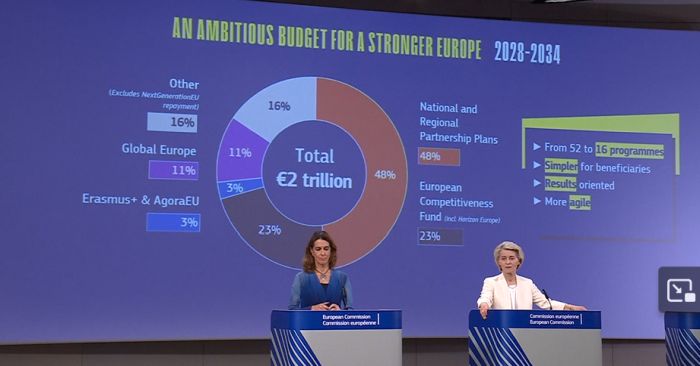
EU Commission presents proposal for new Multiannual Financial Framework 2028–2034

The goal: a future-proof, flexible and crisis-proof budget
Against a backdrop of growing geopolitical uncertainty and structural challenges, the Commission is proposing a reformed EU budget. The aim is for it to become simpler, more effective and more responsive, with clear objectives: strengthening European competitiveness, reducing social and regional disparities, promoting innovation and better preparing the EU for crises.
The most important changes at a glance
1. European Competitiveness Fund: €409 billion for strategic sovereignty
This new fund will pool investments in key technologies, such as clean energy, digitalisation, biotechnology and defence. The aim is to strengthen Europe's independence in critical areas and secure its position as a global leader in technology.
2. Research and innovation: Horizon Europe remains the flagship
With 175 billion euros, the EU research framework, with its flagship Horizon Europe, remains a central component of the new budget. It will be closely linked to the Competitiveness Fund to promote innovation from idea to market launch.
3. National partnership plans: greater coherence and impact
For the first time, all EU funds for member states and regions will be pooled into uniform partnership plans. This should allow reforms and investments to be implemented more efficiently and effectively across areas ranging from cohesion policy to agriculture.
4. Crisis response mechanism and prevention union
A new crisis mechanism with a credit volume of up to €400 billion is intended to make Europe better prepared for future shocks. This will be supported by enhanced prevention measures in areas such as health, civil protection, and food security.
5. A stronger role in the world: €100 billion for Ukraine
A dedicated foreign policy financing instrument worth €200 billion, along with an additional €100 billion earmarked for Ukraine, is intended to secure Europe's strategic role in the world and bolster the EU accession process for candidate countries.
New own resources: expanding the financing base
In order to finance the ambitious budget, the Commission is proposing five new sources of revenue, including those derived from an emissions trading scheme, a CO₂ border adjustment mechanism (CBAM), a levy on electronic waste and a new corporate tax (CORE). These are expected to generate around €58.5 billion per year, reducing the burden on national budgets.
Next steps
The Commission's proposal will now be discussed by the Council of the EU. Adoption of the Multiannual Financial Framework (MFF) requires unanimous agreement among the Member States and approval by the European Parliament. Some elements, particularly the new own resources, also require national ratification.




